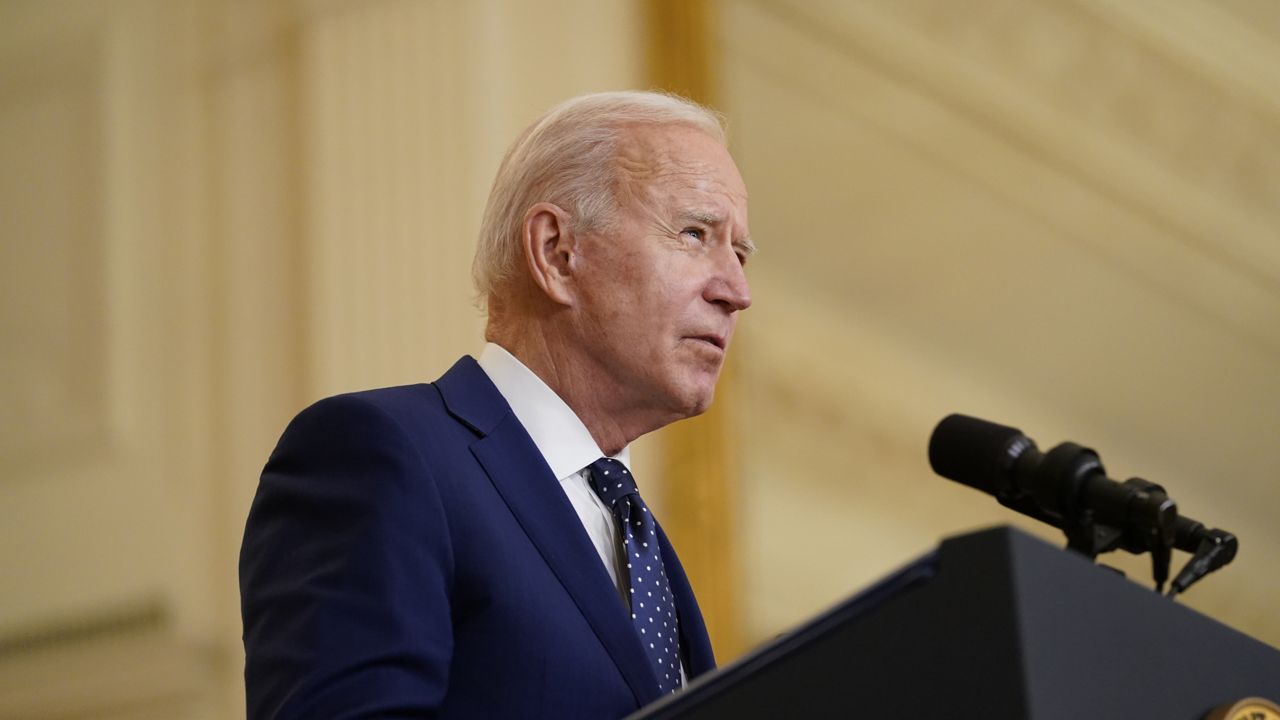President Joe Biden on Friday signed an emergency determination that officials said would speed refugee admissions to the U.S., but he did not immediately lift his predecessor's historically low cap of 15,000 refugees for this year.
After blowback from allies and advocates, the White House later announced that President Biden will indeed lift the Trump-era refugee caps next month.
Biden, instead, is adjusting the allocation limits set by former President Donald Trump, which officials said have been the driving factor in limiting refugee admissions. The new allocations provide more slots for refugees from Africa, the Middle East and Central America and lift Trump's restrictions on resettlements from Somalia, Syria and Yemen.
Since the fiscal year began on Oct. 1, just over 2,000 refugees have been resettled in the U.S. A senior administration official said Biden's new allocations, formalized in an emergency presidential determination, could result in speedier admissions of already screened and vetted refugees in a manner of days.
The allocations for Fiscal Year 2021 are as follows, per the White House:
- Africa: 7,000
- East Asia: 1,000
- Europe and Central Asia: 1,500
- Latin America and the Caribbean: 3,000
- Near East and South Asia: 1,500
- Unallocated Reserve: 1,000
White House press secretary Jen Psaki issued a statement Friday afternoon in an attempt to clarify the directive: "We expect the President to set a final, increased refugee cap for the remainder of this fiscal year by May 15."
Advocates immediately called the news "disappointing," especially after the president previously said he would aim for a goal of 62,500, half of the goal he plans to set for 2022.
“It is disappointing and really unusual to see the administration backtrack on their proposal,” Sunil Varghese, Policy Director at the International Refugee Assistance Project told Spectrum News. “Maybe it would be difficult to actually resettle that number in the months we have left in the fiscal year. But that sort of symbolism is really important.”
More than two months ago, Biden pledged to raise the refugee cap for the next fiscal year to 125,000 and signaled he would try to make a “down payment” on that this year, but he acknowledged it wouldn't be easy.
“It’s going to take time to rebuild what has been so badly damaged, but that’s precisely what we’re going to do,” Biden said in February at the State Department.
The White House said it intends to use all 15,000 slots under the existing cap. The senior administration official, speaking on the condition of anonymity to discuss the matter, said that Biden also would raise the current year cap if needed, but that the priority was moving to adjust from which areas refugees would be admitted.
Psaki said Friday that the delay in Biden acting was because “It took us some time to see and evaluate how ineffective, or how trashed in some ways the refugee processing system had become, and so we had to rebuild some of those muscles and put it back in place.”
But experts worry that keeping the admissions low this year will instead slow efforts to rebuild the refugee program.
“Resettlement agencies say they're ready and waiting,” Varghese said. “How are they going to get to 125,000 without making what the President himself called a ‘down payment’ now?”
Officials also cited the ongoing COVID-19 pandemic but said the expanding vaccination and testing campaigns are making it easier to process new refugee admissions.
Another concern has been the record pace of unaccompanied migrants crossing the U.S.-Mexico border, which has drawn in many of the resources that would go to vetting, processing and resettling refugees in the U.S.
“It is a factor," said Psaki, noting that the Office of Refugee Resettlement "does management and has personnel working on both issues and so we have to ensure that there is capacity and ability to manage both.”
The news is especially devastating for tens of thousands of Iraqi interpreters who worked with the U.S. military in combat over the last two decades. Their lives are threatened because they're painted as traitors for their work, which is why the United States gave them special priority to apply for protection as refugees.
But the program has lapsed in recent years, especially as President Trump cut refugee admissions to record lows, and processing has slowed to a near-standstill. The program for Iraqis has bipartisan support in Congress and from veterans, defense officials and advocacy groups alike, and it's considered vital to national security.
The administration did not immediately respond to a request for comment on how the low admissions cap will impact the processing of Iraqi allies.
Lawmakers criticized the Biden administration's decision, with progressive Rep. Alexandria Ocasio-Cortez (D-NY) calling it "completely and utterly unacceptable."
"Biden promised to welcome immigrants, and people voted for him based on that promise," she wrote in a Twitter post. "Upholding the xenophobic and racist policies of the Trump admin, incl the historically low + plummeted refugee cap, is flat out wrong."
"It is simply unacceptable and unconscionable that the Biden Administration is not immediately repealing Donald Trump’s harmful, xenophobic, and racist refugee cap that cruelly restricts refugee admissions to a historically low level," said fellow progressive Rep. Pramila Jayapal (D-WA).
In a letter, Sen. Bob Menendez (D-NJ) urged Biden to follow through on his commitment to raise the refugee cap: "In this time of great global need, the United States must demonstrate its robust commitment as a nation by resettling the world’s most vulnerable refugees."
Sen. Richard Blumenthal (D-CT) said that "this cruel policy is no more acceptable now than it was during the Trump Administration."
Sen. Dick Durbin (D-IL), the No. 2 Democrat in the Senate, called the move "unacceptable."
"These refugees can wait years for their chance and go through extensive vetting," he added. "Thirty-five thousand are ready. Facing the greatest refugee crisis in our time there is no reason to limit the number to 15,000."
The Associated Press contributed to this report.



